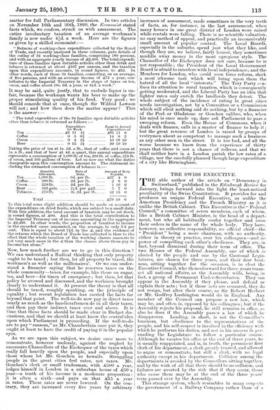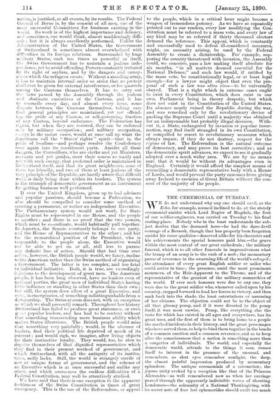THE SWISS EXECUTIVE. T HE able author of the article on
"Democracy in Switzerland," published in the Edinburgh Review for January, brings forward into the light the least-noticed peculiarity of the Swiss Constitution. It provides for and produces an unique Federal Executive, as unlike the American Presidency and the French Ministry as it is unlike the British Cabinet. This Executive is the" Federal Council," a committee of seven members, each of whom, like a British Cabinet Minister, is the head of a depart- ment, but who all habitually confer together and issue their orders in the name of the whole body. They have, however, no collective responsibility, no official chief—the "President" being a mere chairman, with no authority, either in theory or practice, over his colleagues—and no power of compelling each other's obedience. They are, in fact, beyond dismissal during their term of office. The two Houses of the Federal Assembly, one of which is elected by the people and one by the Cantonal Legis- latures, are chosen for three years, and their first busi- ness, sitting together for the occasion, is to elect the Executive Council, who thenceforward for three years trans- act all national affairs, as the Assembly wills, being, in fact, a group of Permanent Under-Secretaries. They can appear in the Assembly if they please, and defend or explain their acts ; but if those acts are censured, they do not resign, but alter their course, as Sir Robert Herbert or Mr. Godfrey Lushington would do in England. Any member of the Council can propose a new law, which may be, and often is, opposed by his colleagues; but if the Assembly rejects his proposal, he still remains in office, as also he does if the Assembly passes a law of which he disapproves. Leading, in short, is not the Councillor's business, but obedience to the representatives of the people, and his self-respect is involved in the efficiency with which he performs his duties, and not in his success in per- suading the Legislature to follow a particular course. Although he vacates his office at the end of three years, he is usually reappointed, and is, in truth, the permanent first clerk of his department, a clerk greatly trusted, and allowed to argue or remonstrate, but still a clerk, with no legal authority except in his department. Collision among the departments is avoided by the Councillors sitting together, and by the wish of all that there should be no collision, and failures are averted by the risk that if they occur, those who cause them may be at the end of the three years' term passed over by the Assembly. This strange system, which resembles in many respects the government of a Railway Company rather than of a nation, is justified, at all events, by its results. The Federal Council of Berne is, by the consent of all men, one of the most successful Committees for business existing in the world. Its work is of the highest importance and delicacy, alid sometimes, one would think, almost maddeningly diffi- cult; but it is always excellently performed. Unlike the Administration of the United States, the Government of Switzerland is sometimes almost overwhelmed with diflieulties in its foreign relations. Surrounded by huge hi Hoary States, each ten times as powerful as itself, the Swiss Government has to maintain a jealous inde- pendence, yet to avoid offending Powers constantly irritated by its tight of asylum, and by the dangers and annoy- ances which the refugees create. Without a standing army, it has to maintain internal order so strict that no pretext shall ever be given for external interference, or for quarrels among the Cantons themselves. It has to carry out the laws passed by the Assembly through the jealous and obstinate executives of the Cantons, and it has to reconcile every day, and almost every hour, some dispute between the Cantons themselves, taking care that general principles are maintained, yet not offend- ing the pride of any Canton, or self-governing fraction of any Canton, beyond endurance. The Federation has rights, but when they are resisted, they can be enforced only by military occupation ; and military occupation, e,;.i_ept in the rarest cases, would at once call up what the Americans call the "States' rights" spirit—that is, the pride of localism—and perhaps resolve the Confederacy once again into its constituent parts. Amidst all these dangers, the Councillors, who are clerks and yet Ministers, servants and yet guides, steer their course so warily and yet with such energy, that profound order is maintained in Switzerland itself, and that its great neighbours, none of them too friendly, and two of them at least jealous of the very principle of the Republic, are hardly aware that difficult work is daily being done within its borders. The system is the triumph of democratic government as an instrument for getting business well performed.
If ever the -United Kingdom, given up to bad advisers and popular passions, should become a Federation, we also should be compelled to consider some method of creating a permanent, or rather an independent Executive. The Parliamentary system would not work, for State Rights must be represented in one House, and the people in another ; and there is no proof that the two powere, which must be co-ordinate, would habitually pull together.
In America, the Senate constantly belongs to one party, and the House of Representatives to the other ; and but for the monarchical position of the President, who is responsible to the people alone, the Executive would not be able to get on at all, still less to pursue any definite line of action. Should that bad time ever arrive, however, the British people would, we fancy, incline to the American rather than the Swiss method of organising a Government. The latter is too complex, and too fatal to individual initiative. Both, it is true, are exceedingly injurious to the development of great men. The American people, it has been long observed, have no leaders even of national parties, the great men of individual States having little influence or standing in other States than their own ; hut still, the system does allow of a great Executive, and even, in emergencies, of something indistinguishable from a dictatorship. The Swiss system does not, with an exception on which we shall presently remark. Throughout her history Switzerland has failed to produce great statesmen, or even grunt popular leaders, and has had to be content without that something transcending mere business ability which makes States illustrious. The British people would miss that something very painfully ; would, in the absence of leaders, find their political life deprived of much of its interest ; and would sigh, we imagine, after living objects for their instinctive loyalty. They would, too, be slow to deprive themselves of that dignified representation which they find in their present method of government, and which Switzerland, with all the antiquity of its institu- tions, sadly lacks. Still, the world is .strangely sterile of new or unique forms of government, and the scheme of an Executive which is at once successful and unlike any other, and which overcomes the endless difficulties of a Federal Constitution, may well be attentively studied. We have said that there is one exception to the apparent feebleness of the Swiss Constitution in times of great emergency. This is the use of the Referendum, or appeal to the people, which in a critical hour might become a weapon of tremendous potency. As we have so repeatedly pointed out to our readers, every law modifying the Con- stitution must be referred to a mass vote, and every law of any kind may be so referred if thirty thousand electors demand the reference. This appeal, which is constantly and successfully used to defeat ill-considered measures, might, on necessity arising, be used by the Federal Assembly to create a dictatorship. For example, sup- posing the country threatened with invasion, the Assembly could, we conceive, pass a law making itself absolute for six months, "in all matters deemed essential for the National Defence," and such law would, if ratified by the mass vote, be constitutionally legal, or at least legal enough—for a lawyer might object that even the pro- posal of such a law was ultra vires—to be universally obeyed. That is a right which in extreme cases ought to exist in every Constitution, which does exist in our own, Parliament being in theory despotic, but which does not exist in the Constitution of the United States. Its absence nearly ruined the Republic during the war, and was remedied only by the revolutionary device of packing the Supreme Court until a majority was obtained for an indispensable but probably illegal decision. With- out it, a State, endangered by invasion or popular insur- rection, may find itself strangled in its own Constitution, or compelled to resort to revolutionary measures which always impair, if they do not destroy, respect for the rt.'gime of law. The Referendum is the natural outcome of democracy, and may prove its best corrective ; and as the democratic spirit advances, we expect to see it gradually adopted over a much wider area. We are by no means sure that it would be without its advantages even in England. Certainly it would afford the simplest means of reconciling a democratic representative body with a House of Lords, and would prevent the party caucuses from giving away Ireland to enemies of Great Britain without the con- sent of the majority of the people.



















































 Previous page
Previous page